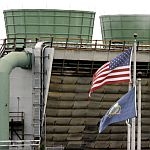 (Host) From time to time, the Vermont Supreme Court takes its proceedings on the road to make its workings more accessible to citizens outside Montpelier.
(Host) From time to time, the Vermont Supreme Court takes its proceedings on the road to make its workings more accessible to citizens outside Montpelier.
On Tuesday the justices were at the Windham Superior courthouse in Newfane. One of the cases they heard involved whether Entergy Vermont Yankee should be allowed to release warmer water into the Connecticut River.
VPR’s Susan Keese has more.
Gavel – "The honorable Supreme Court…"
(Keese) Vermont Yankee uses water to absorb some of the heat created when it generates electricity. Since 1990, the plant has saved energy in the summer months by discharging that water directly into the Connecticut, instead of cooling it first through its cooling towers.
Attorney Gwen Williams presented oral arguments for Entergy, the nuclear plant’s owner.
(Williams)"Whenever you operate the plant in a closed cycle method, a method that would not discharge heated water to the river, it requires energy that you’re generating to operate that way. So the plant has less energy available for output. And particularly in the summer months when … the demand for electricity is the greatest, I think it’s important that the citizens of Vermont have enough power to meet their needs."
(Williams) The cooling water isn’t radioactive, but it does raise the river temperature. In 2006 the Agency of Natural Resources granted Entergy, the plant’s owner, an amendment to its discharge permit. The amended permit allows Entergy to release slightly warmer water to the river.
Environmental groups challenged that approval in the state’s Environmental Court.
The court sided with Entergy, although it added new conditions. Now the environmental groups are challenging that decision.
(Mears) "It’s an important case for the state of Vermont because it deals with this very critical issue of protecting the Atlantic Shad populations …in the Connecticut River."
(Keese) Attorney David Mears, who teaches at Vermont Law School, argued for the environmental groups. He said the part of the river where the discharge occurs is designated cold water habitat by the state.
Mears said the designation was made to help encourage the return of shad and other cold water species. Mears said the Environmental Court’s decision neglected that designation.
Entergy lawyer Gwen Williams argued that the company relied more on federal guidelines than the state’s numerical designation. She said Entergy presented ample evidence that the shad would not be harmed.
(Williams) "If an applicant can show that adding more heat would not harm the population, then both state and federal law says you can do that."
(Keese) The justices are expected to decide the case within the next few months.
For VPR News, I’m Susan Keese.